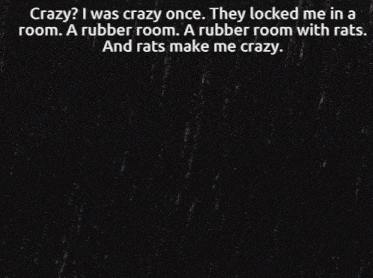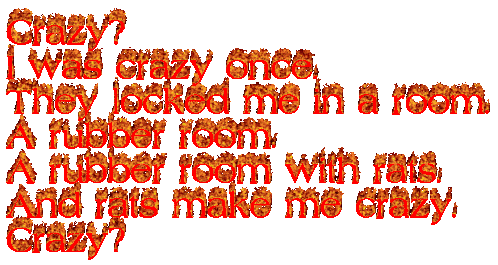Crazy? I Was Crazy Once: Unpacking The Viral Poem That Keeps Us Looping
The phrase hits you like a familiar jingle, a half-remembered nursery rhyme with a dark twist: "Crazy? I was crazy once. They locked me in a room. A rubber room! A rubber room with rats, and rats make me crazy." For many, these words conjure a vivid, almost unsettling image, echoing through schoolyards, online forums, and countless meme compilations. It's a phrase that, once heard, tends to loop endlessly in the mind, much like the poem itself.
But what exactly is this curious piece of oral tradition? Where did it come from, and why has it maintained such a tenacious grip on our collective consciousness, evolving from a simple chant into a widespread internet meme? In this article, we'll dive deep into the origins, variations, and the peculiar psychology behind "Crazy? I was crazy once," exploring why this recursive rhyme continues to resonate with so many.
The Core of the Madness: What is "Crazy? I Was Crazy Once?"
At its heart, "Crazy? I was crazy once" is a short, cyclical poem or chant characterized by its repetitive and self-referential nature. The most commonly known version, as cited in numerous online discussions and meme communities, follows this structure:
- Crazy?
- I was crazy once.
- They locked me in a room.
- A rubber room!
- A rubber room with rats.
- And rats make me crazy.
- (And then it loops back to "Crazy? I was crazy once.")
The humor and unsettling brilliance of the poem lie in its infinite loop. The very thing that made the narrator crazy (the rats in the rubber room) leads them back to the initial state of madness, trapping them in a perpetual cycle. This recursive structure is key to its memorability and its ability to stick in the minds of those who encounter it.
Interestingly, there are slight variations. One version, perhaps an older iteration, goes: "I was crazy once. Locked me up in a padded room, the room was cold, cold like the ground, the ground has worms, and worms make me crazy." While less common now, it shares the same core concept of an external factor leading to madness and implies a similar cyclical nature, even if not explicitly stated in the provided snippet.
Tracing the Roots: Where Did It Come From?
Pinpointing the exact origin of such a widespread, orally transmitted piece of folklore is notoriously difficult. Unlike a published work, these phrases often emerge from the ether of collective consciousness, spreading organically through various channels. However, based on available data, we can piece together a fascinating timeline.
From Playgrounds to Usenet: Early Appearances
Anecdotal evidence suggests that this rhyme was circulating among children long before the internet became ubiquitous. Many recall learning it as a kid from other children in their neighborhood, with memories stretching back to the late '90s and early 2000s, "definitely pre-2005." This indicates a strong tradition of oral transmission, passed down from one generation of schoolchildren to the next, much like jump rope rhymes or hand-clapping games.
Simultaneously, or perhaps shortly thereafter, the phrase began to appear in early online communities. Research indicates that "the earliest mention of the 'Crazy? I was crazy once' poem that I could find is from a Usenet group called alt.support.depression." This is a significant finding. The appearance in a support group for depression suggests that the rhyme, despite its dark humor, might have served as a coping mechanism or a way to articulate feelings of being overwhelmed or driven to the brink, albeit in a lighthearted, absurdist manner.
The Elusive "Original"
It's important to note that there isn't a single, definitive "original" author or source that has been widely recognized. The phrase is a classic example of urban folklore, evolving and adapting as it travels. The variations, like the "padded room, cold like the ground, worms" version, further underscore its organic development, where different elements might be swapped or added over time while retaining the core theme of induced madness and confinement.
Why It Went Viral: The Psychology of a Loop
What makes a seemingly simple, somewhat morbid rhyme so incredibly sticky and shareable? Its enduring popularity can be attributed to several psychological and cultural factors.
Repetition and Memorability
The most obvious reason for its virality is its structure. The repetition of "room," "rubber room," and "rats" creates a rhythmic, almost hypnotic effect. This makes it incredibly easy to remember and recite, turning it into an "earworm" that lodges itself in the listener's mind. The recursive loop ensures that once you start, it's hard to stop, reinforcing its memorability.
Dark Humor and Relatability
Despite its unsettling premise of being locked away and driven mad, the poem is often shared with a sense of dark humor. The absurdity of the situation – being driven crazy by rats, which then leads to being locked up, which then leads to more rats – is inherently funny in a macabre way. Furthermore, the feeling of being "driven crazy" by external circumstances, whether it's a frustrating job, an annoying sibling, or simply the chaos of daily life, is surprisingly relatable. The poem provides a hyperbolic, yet cathartic, outlet for expressing these feelings.
Community and Shared Experience
The spread of "Crazy? I was crazy once" across online communities, particularly in spaces dedicated to memes, highlights its role in fostering shared experiences. In the "memes community" on platforms like Reddit, with its "32M subscribers," phrases like this thrive. A post featuring the rhyme can garner thousands of votes and comments, as seen with "1.9K votes, 141 comments" or "224 votes, 28 comments." Sharing this rhyme becomes an inside joke, a shorthand for acknowledging a shared understanding of frustration or a shared appreciation for absurd humor. As one explanation puts it, "The joke is that they were crazy once, and they were locked in a room, a rubber room, a rubber room with rats, and the rats made them crazy once, and they were locked..." This self-referential explanation perfectly encapsulates the shared enjoyment of its cyclical nature.
The Meme Machine: How It Lives On
In the digital age, "Crazy? I was crazy once" has found a new lease on life as a versatile internet meme. Memes, described as "a way of describing cultural information being shared," are perfect vehicles for such a phrase. Its adaptability means it can be used in countless contexts:
- As a reaction image or GIF to express extreme frustration or a feeling of being overwhelmed.
- A humorous caption for relatable, maddening situations (e.g., "My internet connection keeps cutting out. Crazy? I was crazy once...").
- A way to introduce a story about a chaotic or absurd experience.
- A simple, nostalgic reference for those who grew up hearing it.
The fact that it continues to be posted and engaged with on platforms like Reddit (e.g., "Posted by u/TTVRealMaruChan - 13 votes and 7 comments") years after its initial widespread circulation is a testament to its enduring power. It has transcended its origins as a playground chant to become a digital cultural touchstone, a linguistic earworm that perfectly encapsulates a particular brand of exasperated, self-aware humor.
Conclusion
From whispered chants in schoolyards of the late 20th century to viral sensations in 21st-century online forums, "Crazy? I was crazy once" is more than just a silly rhyme. It's a fascinating example of how cultural information spreads and evolves, adapting to new mediums while retaining its core appeal. Its simple, recursive structure makes it unforgettable, while its dark humor and relatable themes of frustration and madness resonate deeply with audiences. It's a testament to the power of repetition, the allure of the absurd, and the human need to find humor even in the most unsettling of scenarios.
In summary, "Crazy? I was crazy once" is a widely recognized, cyclical poem that likely originated from oral tradition among children in the late 20th century, finding early online presence in Usenet groups. Its enduring popularity stems from its highly memorable, repetitive structure, its relatable dark humor about being driven to madness by external factors, and its ability to foster a sense of shared experience within online communities. It continues to thrive as a versatile internet meme, demonstrating the lasting impact of simple, yet profoundly effective, cultural expressions.

Crazy I Was Crazy Once GIF - Crazy I was Crazy once - Discover & Share GIFs

Crazy Meme Sticker - Crazy Meme Rats - Discover & Share GIFs

"Crazy? I was crazy once Word Art" Essential T-Shirt for Sale by